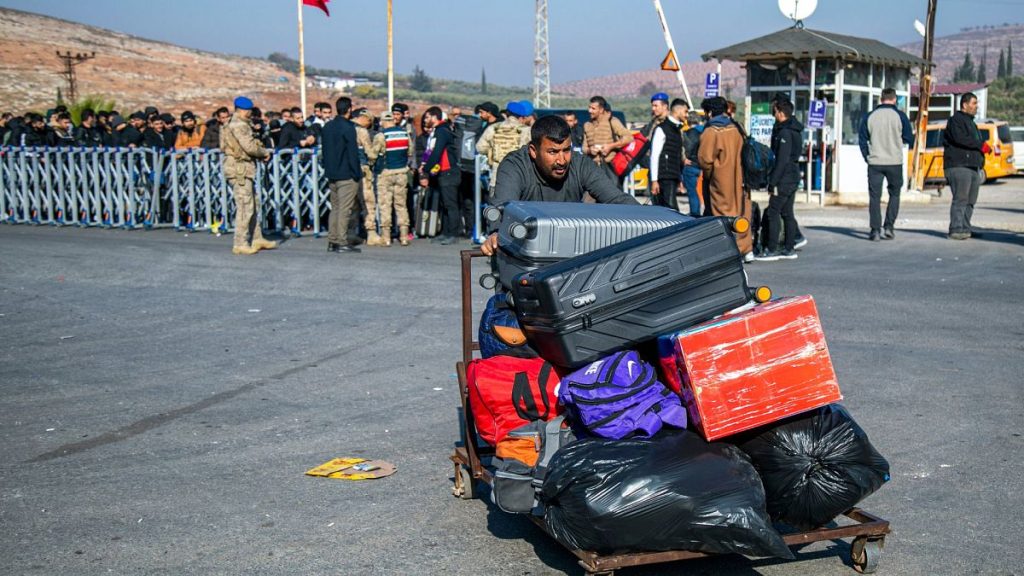The unexpected collapse of Bashar al-Assad’s government in Syria has triggered a wave of hope and anticipation among Syrian refugees in Turkey, prompting many to seek an immediate return to their homeland. Hundreds, if not thousands, converged on Turkey’s southern border crossings, particularly Cilvegozu and Oncupinar, which connect to Bab al-Hawa and Bab al-Salameh on the Syrian side. Scenes of families and individuals laden with belongings, some having camped overnight in the cold, painted a vivid picture of the refugees’ eagerness to return. Their stories echoed a common theme of relief and the desire to rebuild lives interrupted by years of conflict and displacement. The fall of Assad, a figure synonymous with oppression and violence for many, seemed to signal an end to their exile and the dawn of a new era. For many, the return represents a chance to reunite with family members, some of whom had endured imprisonment under Assad’s regime, while others looked forward to reclaiming their homes and livelihoods.
The swift change in Syria’s political landscape has presented both opportunities and challenges. The sudden influx of returning refugees has placed a strain on border crossings, prompting Turkish President Recep Tayyip Erdoğan to announce the opening of a third crossing to manage the flow. Erdoğan expressed optimism about increasing voluntary returns as stability improves within Syria, emphasizing the importance of these returns being “safe and honourable.” This sudden shift underscores the delicate balance Turkey must maintain between facilitating the refugees’ desire to return and ensuring the process is orderly and secure. Turkey, having hosted millions of Syrian refugees for over a decade, now faces the complex task of supporting a potential large-scale repatriation while simultaneously addressing its own internal economic pressures and shifting public opinion regarding the refugee population.
The Syrian refugees’ journey back home is not without its uncertainties. While the fall of Assad has ignited hope, the future of Syria remains uncertain. The country faces significant challenges in rebuilding its infrastructure, institutions, and social fabric after years of devastating conflict. The stories of returning refugees reflect a mix of hope and apprehension. Some express unwavering determination to rebuild their lives, while others acknowledge the uncertain path ahead, clinging to the belief that any future is preferable to life under Assad’s rule. The rebuilding process will require substantial international support and cooperation to address the widespread destruction and displacement caused by the war.
The Turkish government’s response to the evolving situation has been proactive, with Foreign Minister Hakan Fidan reiterating Turkey’s commitment to supporting the reconstruction of Syria and ensuring the safe return of refugees. This commitment reflects Turkey’s long-standing involvement in the Syrian crisis and its recognition of the shared responsibility in addressing the humanitarian consequences of the conflict. The Turkish authorities’ efforts to manage the border crossings, including verifying documentation and prioritizing orderly passage, highlight the logistical complexities involved in facilitating a large-scale return of refugees. The focus on “safe and voluntary” returns underscores the importance of respecting the refugees’ choices while ensuring their safety and well-being during the repatriation process.
The individual stories emerging from the border crossings provide a poignant human dimension to the larger geopolitical shifts. Refugees like Muhammed Zin, who fled Damascus in 2016 due to the violence, express a profound sense of relief at the prospect of returning to a Syria free from Assad’s rule. Others, like Mustafa Sultan, yearn to reunite with family members separated by years of conflict and imprisonment. The stories of families hoping to rebuild their destroyed homes and reclaim their livelihoods underscore the resilience of the human spirit in the face of adversity. These personal accounts serve as a reminder of the human cost of conflict and the enduring hope for peace and stability.
The evolving situation in Syria represents a turning point for millions of refugees who sought refuge in Turkey. The collapse of Assad’s regime, while unexpected, has opened a window of opportunity for their return. The challenges ahead are significant, but the scenes at the border crossings – families with their belongings, ready to embark on a journey back to a homeland they haven’t seen in years – testify to their unwavering hope for a better future. The international community’s support and cooperation will be crucial in ensuring that this return is sustainable and that Syria can rebuild itself into a peaceful and prosperous nation, finally offering its citizens the security and stability they deserve. The coming months and years will be a critical period for Syria, as it navigates the complex path from conflict to recovery, and the stories of the returning refugees will be a vital part of this historical narrative.














